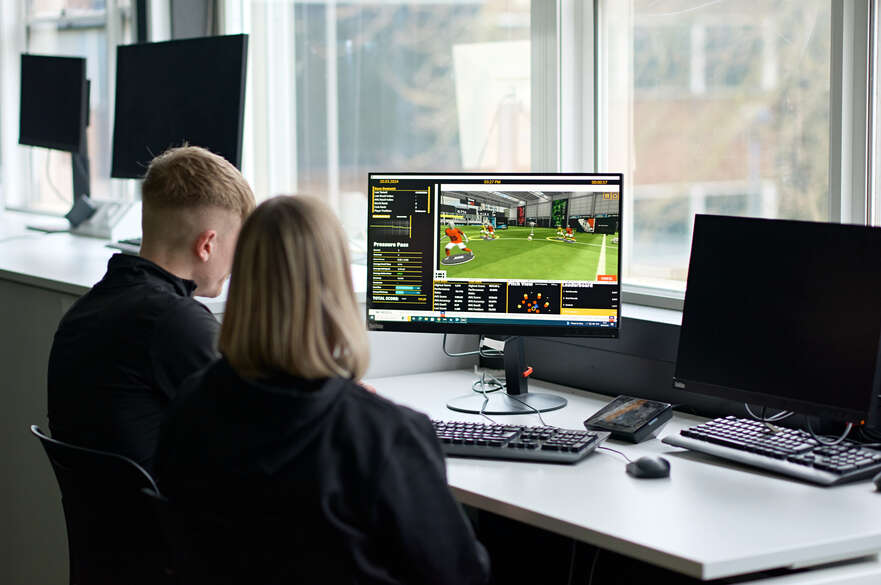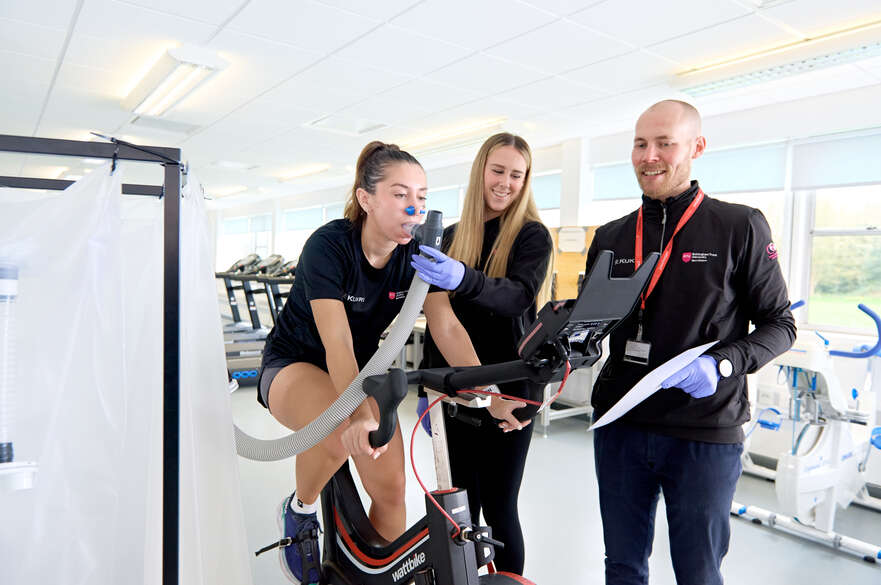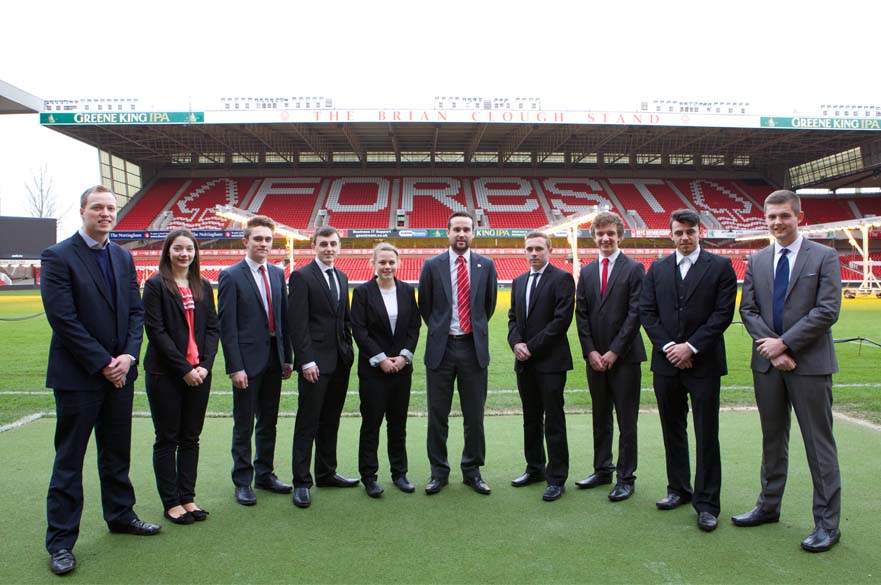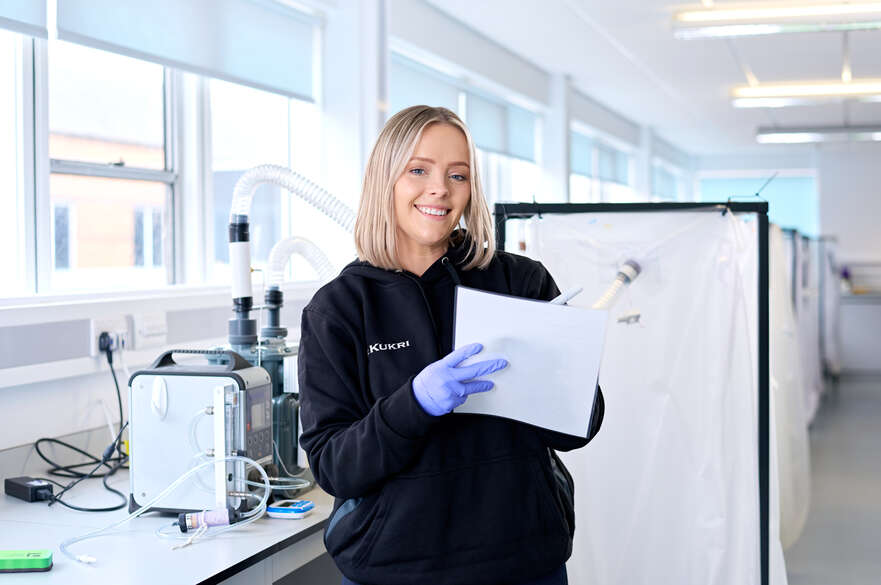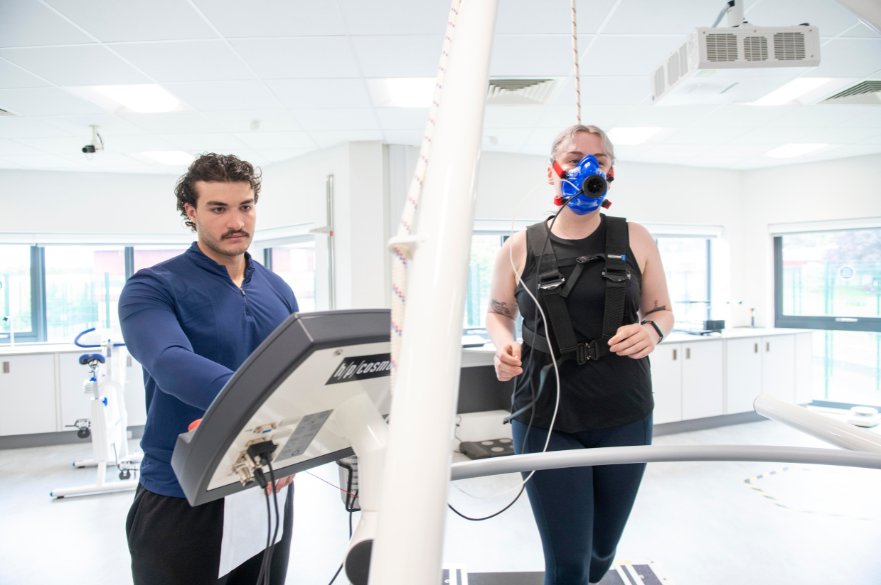This course is in Clearing
Offers from 80 tariff points
About this course
From teaching the basics to celebrating career-defining wins, coaches are essential to sports people’s success at every level. To an individual, a coach is a mentor who oversees, instructs and supports them to be the best they can be. To a team, a coach is a leader who helps tackle challenges head-on and guides them to victory.
In sports coaching, communication is king. A good coach not only needs to know their sport inside out, but they also need excellent teaching, listening and leadership skills. That’s why at NTU, you’ll take all your learning directly to the pitch, track or arena as you get hands-on with our industry partners. You could inspire and teach future stars at grassroots level, assist elite athletes at the top of their game, or make a positive difference to people’s lives by getting involved with community sports initiatives.
BSc Sport Science and Coaching is about using sport and exercise science to inform your sports coaching practice; it’s about developing transferable skills which will benefit you in any career; and above all, it’s about getting out there and doing it for real.
Sport and Wellbeing Academy
Each year a number of our Sport Science students get the chance to work in our Sport and Wellbeing Academy. This exciting opportunity allows you to apply some of the theory you've learned in a real-world environment and develop the skills needed for working in industry. Working alongside our experienced Senior Exercise Practitioners you'll have the opportunity to deliver exercise programmes to help improve the health and wellbeing of the local community.
You can also work with local schools to implement 'The Daily Mile' which improves the fitness and concentration of their pupils. NTU's sports teams are currently in the top ten in the BUCS league (British Universities and Colleges Sport). Our aim is to reach the top and working in the Academy gives you the opportunity to work with our teams on their training, performance and nutrition to make this dream a reality. Find out more about the Academy...
Why study this course?
What you’ll study
Our sports coaching degree is focused on maximising sport and exercise performance by developing evidence-based techniques and applying them to real-life coaching. You’ll examine coaching theory, delve into the science behind exercise physiology and psychology, and test your ideas in our specialist labs and suites. Then, you’ll put all your learning into action with hands-on sports coaching practice, as you tackle live briefs set by our partner organisations and get work-like experience with local people and NTU’s sports community.
After trying out a bit of everything in Year One, you can tailor your degree to suit your ambitions by choosing from an extensive range of optional modules in your second and final year, covering topics from the sociology of sport to observational analysis and talent development.
You’ll also have the opportunity to undertake a coaching qualification, plus you can get a Chartered Institute for the Management of Sport and Physical Activity (CIMSPA) Personal Trainer qualification. This will incur a small fee, but it’s much cheaper than doing it elsewhere.
Study highlights include:
- Build an industry network as you work on briefs set by organisations such as UK Coaching, Paddle UK and Rackets Cubed.
- Take part in sports coaching activities which can lead to nationally-recognised coaching awards.
- Get involved with our Sport and Wellbeing Academy, where you can get face-to-face coaching experience with school children and grassroots sports teams in our local community, or gain personal training experience.
- Get additional qualifications alongside your sports coaching degree, like, a Diploma in Professional Practice during a placement year, and a Personal Trainer certification with CIMPSA.
- Boost your employability further by learning a language on our University Language Programme (ULP), or consider a study year abroad.
- Consider being your own boss, with the support of NTU Enterprise.
Introduction to Sport and Exercise Physiology (20 credit points)
Foundations in Sport and Exercise Psychology (20 cp)
Introduction to Human Movement Science (20 cp)
Sport, Culture and Society: a Critical Introduction (20 cp)
Explore the importance of the social sciences in the understanding of sport and in the education of every sports professional.
Exploring Coaching Practice (20 cp)
Developing Academic and Research Skills (20 cp)
Get an overall perspective of the research process in the context of sport, exercise, health and leisure management, and learn the research skills necessary to successfully complete your studies.
Core modules:
Analysis of Human Movement Science for Sport (20 cp)
Building on the biomechanical principles studied in Year One, you will develop the skills required to explain measurable human movements and forces using biomechanical theories.
Coaching Science (20 cp)
You will devise and implement a coaching programme, drawing upon theory from your other modules.
Applying Coaching Theory to Practice (20 cp)
This module facilitates and encourages further exploration of topics within coaching, and develops the academic skills necessary to relate the study to coaching as a profession.
Integrated Applied and Professional Skills (20 cp)
Using enquiry-based learning, you will continue to learn about the research process and gain an understanding and experience of how research is conducted within sports and exercise science.
Optional modules - choose two:
Applied Sport and Exercise Physiology (20 cp)
Through both theoretical and practical study you will learn how the body’s structures and functions are altered by bouts of physical exercise, and how these concepts can be applied to training.
Practical Applications in Sport and Exercise Psychology (20 cp)
This module introduces the concept of evidence-based practice, and frameworks of assessment, intervention and evaluation to address issues in sport, coaching, social and exercise psychology.
Sociology of Sport, Health and the Body (20 cp)
Develop a critical understanding of the active body in society by connecting key theories and concepts with personal experiences, professional challenges, and popular cultural examples.
Optional year-long work placement. If you are not taking a placement, you will progress directly to your final year in year three.
Core modules:
Sport Project and Dissertation (40 cp)
Advanced Coaching Practice (20 cp)
Performance Skill and Expertise in Sport (20 cp)
This module outlines how human movement and motor programs are initiated, controlled, learned, taught and performed.
Optional modules - choose one:
Strength, Power and Endurance for Sport and Exercise (20 cp)
Advanced Topics in Sport and Exercise Psychology (20 cp)
Students will become familiar with selected areas such as motivational climate, athletic identity, mental toughness, psychology of injury and morality in sport and the emphasis of this module will be placed on current primary research.
Performance Analysis (20 cp)
Explore a range of performance analysis approaches and methodologies using industry-standard hardware and software. You’ll learn the skills for collating, preparing, and analysing performance data before developing recommendations to maximise performance.
Transforming Sport: Sustainability and Social Justice (20 cp)
Study and challenge the accepted beliefs and practices of those who govern and promote sport. Drawing on a variety of topics, this module presents a case for sport sociology as an agent of positive change in sport.
Optional modules - choose one:
Applied Human Movement Science for Sport (20 cp)
The aim of this module is to address in the context of biomechanics how to improve and or optimise human performance and to understand how human performance can be affected by or result in dysfunction.
Challenging Critical Issues in Sport (20 cp)
You'll analyse complex problems such as sports injury, drug use in sport and inequality and develop potential solutions using positive social changes.
Talent Development in Sport (20 cp)
This module will explore a critical view of the role of talent development in sport, focusing on the psychosocial, environmental, and personal factors that can influence the talent development process.
We regularly review and update our course content based on student and employer feedback, ensuring that all of our courses remain current and relevant. This may result in changes to module content or module availability in future years.
Don’t just take our word for it, hear from our students themselves
Video Gallery
How you're taught
How will I learn?
Our sports coaching teaching team share decades of professional experience between them, ranging from industry practice to academic research. At NTU, our outstanding research informs all our teaching – and not only will you be taught by the people behind it, but you’ll also be using the very same facilities and equipment they use.
You’ll learn through a mix of:
- lectures, covering the key theories and most pressing issues in sports and coaching
- seminars, which are smaller-group sessions perfect for learning key skills and collaborative working
- practical workshops using our extensive range of industry-standard facilities
- external visits to the organisations which set your live briefs.
Study abroad opportunities
Get ready to embark on an adventure with our study abroad programs at partner universities or by getting a work placement overseas. Both opportunities will boost your employability, build lifelong friendships, and allow you to experience the world in a whole new way.
Research informed teaching
Our research is tackling real-world issues – and the people working on this research will be teaching you. It also informs the subjects you’ll be studying with us so you can be sure your knowledge will be cutting-edge in your field. In the last Research Excellence Framework (REF 2021) - the UK's system for assessing the quality and impact of research in universities - we’re proud that 100% of NTU's Sport and Exercise Sciences, Leisure and Tourism submission was assessed to be world-leading or internationally excellent.
Learn a new language
Alongside your study you also have the opportunity to learn a new language. The University Language Programme (ULP) is available to all students and gives you the option of learning a totally new language or improving the skills you already have. Find out more about the ULP.
How you're assessed
People excel in different ways, and we want everybody to have the best possible chance of success. That’s why we’ve adopted a range of assessment types on our sport science course, including:
- coursework, including group projects, case studies, dissertation and other assignments
- practical assessments, such as individual and group presentations, laboratory assessments and lab reports
- written exams and multiple-choice tests.
Careers and employability
Sports coaching is an exciting and immensely rewarding career. On this degree, the broad range of topics you’ll cover naturally feed into careers across the wider exercise health and fitness sectors, as well as coaching jobs. But your prospects aren’t limited to the sporting world: you’ll graduate armed with a whole host of transferable skills which can be applied to any job you choose.
You’ll be supported by our award-winning Employability team for up to three years after you graduate, and have access to comprehensive online career resources for life. If you’re a budding entrepreneur, you can even get free advice and guidance in setting up your own business from NTU Enterprise.
Placements
After Year Two, you can complete a year-long placement (or ‘sandwich year’) on a paid or voluntary basis. This sandwich option is a very popular way to gain the vital work experience that employers look for, and 100% of our BSc Sport Science and Coaching (Sandwich) students were in work or further study 15 months after graduation (Graduate Outcomes Survey).
We’ll support you throughout your placement, and you’ll be able to complete a Diploma in Professional Practice while you work.
Our most recent sports coaching placement students have worked at organisations across the UK and beyond, like:
- Football clubs including Notts County FC and Lincoln City FC
- Schools and colleges, such as New College Stamford, Redlands Community Primary School (Loughborough) and Moulton College (Northampton), and paid roles in private schools
- Goal Soccer Academy in Australia
- Spirit Dojo Legacy (mixed martial arts club)
- PGL (children’s adventure holidays)
NTU Enterprise
You'll also have the opportunity to turn your ideas into a viable business with help from NTU Enterprise, NTU's purpose-built Centre for Entrepreneurship and Enterprise, a support centre to help students create, develop and grow their own businesses.
Campus and facilities
You’ll mainly be studying in the Erasmus Darwin and CELS Buildings with access to facilities including an environmental chamber, biomechanics lab, and nutrition suite:
- IT, Sports Psychology and Skill acquisition suites, used for coaching, statistical, and performance analysis.
- Sport, exercise and health physiology laboratories, fully equipped with specialist facilities that cater for different types of exercise testing and physical activity.
- British Olympic Association (BOA) Approved Environmental Chamber, which can simulate climates anywhere in the world, from Everest to Egypt, and has been used by Olympic athletes for acclimatisation to extreme competition environments.
- Human movement and Performance Analysis Suite, including isokinetic and isometric dynamometers for assessing force produced by muscle groups of the body. You will also have access to Vicon, Qualisys and THEIA motion capture systems.
- Clifton Sports Hub Where you will develop your practical skills through coaching and participating Find out more about our sport science facilities.
There are also over 40 sports clubs to get involved with during your time at NTU, allowing you to discover new passions, integrate with our sporting community, and even apply some of your learning to your own pastimes. Plus, all our campuses host their own gym and fitness suites, and you’ll have access to sports coaching and injury clinics.
Our self-contained, community-focused Clifton Campus has been designed to keep students busy between lectures. Catch-up with your course mates in the Pavilion’s barista café and Refectory; brainstorm group presentations in chic and stylish study spaces; enjoy some proper R&R in The Point, home of our Students’ Union. The campus also hosts the multimillion-pound Clifton Sports Hub, offering great options for everyone — whatever your interests, and however competitive you’d like to get!
Take a few steps off campus and you’ll find yourself in the heart of Nottingham — one of Britain’s top 10 student cities, and one of Europe’s top 25. As well as offering a great social scene, it’s one of the UK’s key sporting hubs, home to the iconic Trent Bridge Cricket Ground; Notts County (the world’s oldest professional football league club) and two-time European Cup-winners Nottingham Forest; the Nottingham Tennis Centre, the National Ice Centre, and the National Watersports Centre at Holme Pierrepont; plus rugby union, rugby league, hockey and ice hockey teams.
Take our virtual tour to get a real feel for the campus.
Entry requirements
This course is in Clearing
Looking for a place in Clearing? We are accepting application and would love to hear from you!
UK students
This course is in Clearing
Looking for a place in Clearing? We are accepting applications and would love to hear from you!
Clearing requirements
From 80 UCAS tariff points from up to 4 qualifications.
To discuss our entry requirements and see what we can offer you, call us now on +44 (0)115 848 6000. Alternatively, if you already have your qualifications, apply online via our Clearing Application form.
Preparing for results day? Beat the queue and sign up for NTU Priority for up-to-date information about all things Clearing. You’ll get an offer ahead of Clearing, subject to you achieving the required grades on results day.
Additional Requirements:
- 80 UCAS Tariff points from up to four qualifications including A-level equivalent PE or Science subject*
If you are applying with a BTEC Extended Certificate (previously BTEC Subsidiary Diploma) you will also need an A-level in a science subject or equivalent.
*We will accept Biology, Chemistry, Physics, Maths, Sport Studies or Psychology
To find out what qualifications have tariff points, please use our tariff calculator.
Additional requirements for UK students
There are no additional requirements for this course.
Contextual offers
If you don’t quite meet our entry requirements, we might be able to make you a lower offer based on a range of factors, including your background (such as where you live and the school or college you attended), your experiences and your individual circumstances (you may have been in care, for example). This is called a contextual offer, and we get data from UCAS to help make these decisions. We do this because we believe everyone with the potential to succeed at NTU should have the opportunity to do so, no matter what barriers you may face.
Meeting our entry requirements
Hundreds of qualifications in the UK have UCAS Tariff points attached to specific grades, including A-levels, BTECs, T Levels and many more. You can use your grades and points from up to four different qualifications to meet our criteria. Enter your predicted or achieved grades into our Tariff calculator to find out how many points your qualifications are worth.
Other qualifications and experience
NTU welcomes applications from students with non-standard qualifications and learning backgrounds, either for year one entry or for advanced standing beyond the start of a course into year 2 or beyond.
We consider study and/or credit achieved from a similar course at another institution (otherwise known as credit transfer), vocational and professional qualifications, and broader work or life experience.
Our Recognition of Prior Learning and Credit Transfer Policy outlines the process and options available for this route. If you wish to apply via Recognition of Prior Learning, please contact the central Admissions and Enquiries Team who will be able to support you through the process.
Getting in touch
If you need more help or information, get in touch through our enquiry form.
International students
This course is in Clearing
Looking for a place in Clearing? We are accepting applications and would love to hear from you!
Clearing requirements
From 80 UCAS tariff points from up to 4 qualifications.
To discuss our entry requirements and see what we can offer you, call us now on +44 (0)115 848 6000. Alternatively, if you already have your qualifications, apply online via our Clearing Application form.
Preparing for results day? Beat the queue and sign up for NTU Priority for up-to-date information about all things Clearing. You’ll get an offer ahead of Clearing, subject to you achieving the required grades on results day.
Additional Requirements:
- 80 UCAS Tariff points from up to four qualifications including A-level equivalent PE or Science subject*
If you are applying with a BTEC Extended Certificate (previously BTEC Subsidiary Diploma) you will also need an A-level in a science subject or equivalent.
*We will accept Biology, Chemistry, Physics, Maths, Sport Studies or Psychology
Additional requirements for international students
If you need help achieving the academic entry requirements, we offer a Foundation preparation course for this degree. The course is offered through our partner Nottingham Trent International College (NTIC) based on our City Campus.
- We accept equivalent qualifications from all over the world. Please check your international entry requirements by country.
- English language requirements: See our English language requirements page for requirements for your subject and information on alternative tests and Pre-sessional English.
English language requirements
View our English language requirements for all courses, including alternative English language tests and country qualifications accepted by the University.
If you need help achieving the language requirements, we offer a Pre-Sessional English for Academic Purposes course on our City campus which is an intensive preparation course for academic study at NTU.
Other qualifications and experience
If you have the right level of qualifications, you may be able to start your Bachelors degree at NTU in year 2 or year 3. This is called ‘advanced standing’ entry and is decided on a case-by case basis after our assessment of your qualifications and experience.
You can view our Recognition of Prior Learning and Credit Transfer Policy which outlines the process and options available, such as recognising experiential learning and credit transfer.
Sign up for emails
Sign up to receive regular emails from the International Office. You'll hear about our news, scholarships and any upcoming events in your country with our expert regional teams.
Getting in touch
If you need advice about studying at NTU as an international student or how to apply, our international webpages are a great place to start. If you have any questions about your study options, your international qualifications, experience, grades or other results, please get in touch through our enquiry form. Our international teams are highly experienced in answering queries from students all over the world.
Policies
We strive to make our admissions procedures as fair and clear as possible. To find out more about how we make offers, visit our admissions policies page.



